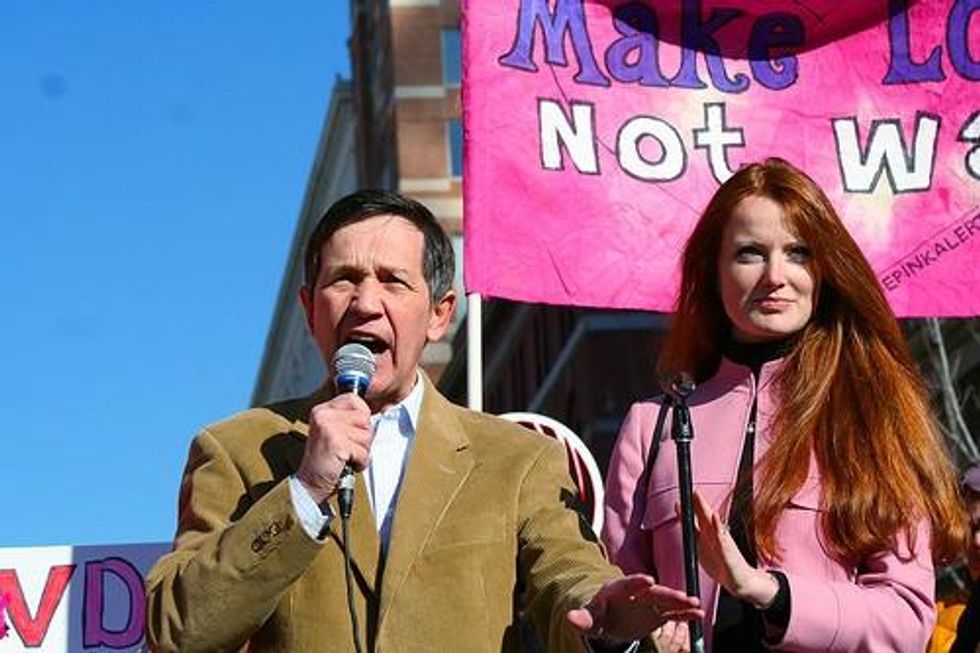A certain kind of politician is becoming a dwindling breed. I'm not thinking of the over-praised and frequently eulogized centrist, the kind who spends a career watering things down and gets lionized for having done so. I mean the bold, politically courageous people who make real the cliche, "Speak truth to power." The ones who are, perhaps, a little too righteous, who don't compromise easily, but who prove again and again a tendency to be correct. They are the ones who are harder to dismiss, no matter how much the pundits or corporate media try. They insert themselves into the national conversation, pushing their ideas and their vision into the debate.
Dennis Kucinich is one of those politicians. At least, he was. Last week, thanks in large part to Republican gerrymandering, he lost his bid for reelection. In his loss, the country loses something too. Whatever your view of Kucinich's politics or style, he mattered a great deal.
Kucinich was never afraid to take the positions that should have been at the core of the Democratic party. He opposed the Patriot Act when few brave Democrats would join him. He was opposed to the Iraq war from the outset, whipping his colleagues against it, with the result that three-fifths of House Democrats voted against that immoral, illegal invasion. Once it began, he called on Congress to defund it, when few in his party were willing to go along. Despite almost no political support, he introduced articles of impeachment against Vice President Cheney, accusing him (rightly, I believe) of lying to the American people to get us into the war in Iraq.
He railed against the expansion and abuse of executive authority, during both Bush's and Obama's terms. He called for a Truth and Reconciliation Commission in America, modeled after those in South Africa, to shed light on the politicization of 9/11. He called forcefully for an end to hostilities in Gaza, deploring the killing of innocent civilians by Israeli soldiers. He warned, as he still warns, of fear-mongering that would lead to another war of choice, this one with Iran.
Kucinich is the co-author, with Rep. John Conyers, of the single-payer health care for all bill. He served as the third chair of the Congressional Progressive Caucus, an organization now headed by Rep. Raul Grijalva and Rep. Keith Ellison, which serves as progressives' first point of leverage inside the D.C. Beltway. And he stood unwaveringly for economic justice, on the side of labor unions, on the side of fair trade, on the side of all who believed that a battle against economic inequality was the war worth waging.
Even before redistricting, taking such positions put him at great political risk. As progressive political strategist Steve Cobble noted in The Nation in 2008, "No one else who shares most of Kucinich's positions -- even those who are much less outspoken than he is -- also has a district like his. He's not from Berkeley or Madison. He doesn't have a huge, liberal base constituency. Dennis Kucinich is consistently braver than his district would suggest he should be."
Kucinich was a frequent contributor to The Nation, and his political courage was often written about in its pages by people like Studs Terkel, Gore Vidal and our political correspondent John Nichols. I wrote about him many times myself, once in particular to defend him against a classic example of inside-the-beltway policing of the debate, when he was ridiculed by The Post's Dana Milbank for supporting Cheney's impeachment.
I have not always agreed with Kucinich's views or his tactics. But I have great respect for the courage he has displayed, and how hard he tried to move the conversation in Washington back toward the left. We lose something big and meaningful when outspoken progressives like Kucinich or Russ Feingold or Barney Frank no longer hold public office. We lose the counterbalance that we need against the powerful forces that have gathered on behalf of the 1 percent.
The truth is, members of Congress like Kucinich cannot just be replaced by those who quietly vote the same way. It's not just the numbers, but the principled, outspoken debate that stakes out the progressive positions, and thus helps define the true national center. Dennis Kucinich believes in the power of progressive ideas and ideals, and did his best to force the media to pay attention to them. That's what made him important to us. That's what made him matter more than the average congressman. Indeed, more than most.




